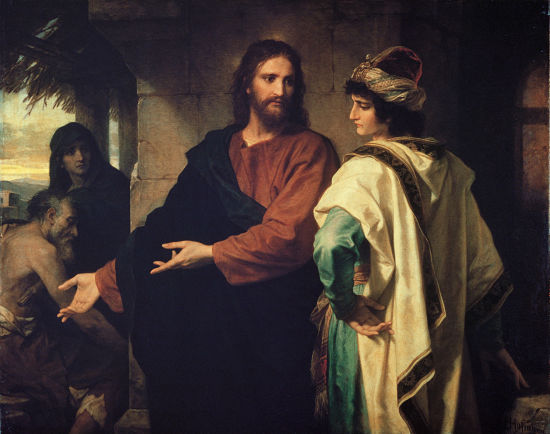Prosperity Theology
- Details
- Category: Mass Deception

Theme Text– “Again I tell you, it is easier for a camel to go through the eye of a needle than for someone who is rich to enter the kingdom of God.” Matt 19:24.
1) What is Prosperity Gospel?
It’s a modern theology that says God wants Christians to enjoy worldly success, wealth, and health. It claims God gives believers a life free of sickness and poverty as a reward. Usually the church leader encourages people to indulge in verbal chants/repetitions of bible verses, and to contribute one tenth of their earnings to the church.
2) What are the beginnings of this health and wealth gospel?
- It started in the 19th century with the New Thought movement (‘A healthy mind leads to healthy living’).
- Then in the 1940s and 50s (the post -War period), the Healing Revival revived belief in healing.
- This was followed by the Word of Faith movement that preached physical, emotional, spiritual healing and financial prosperity with the right faith confessions.
- By the 1980s, televangelists reached millions of homes with promises of all kinds of success. Their popularity led the Charismatic churches to adopt this theology resulting in the formation of non-denominational mega-churches.
3) What scripture texts do proponents of this theology quote?
The primary verse they use is Malachi 3:10 - ‘Bring the whole tithe into the storehouse, that there may be food in my house. Test me in this,” says the Lord Almighty“, and see if I will not throw open the floodgates of heaven and pour out so much blessing that there will not be room enough to store it’.
The problem is – Tithing was part of the Mosaic Law (Leviticus 27:30-33). The Law told the Israelites to bring 1/10th of all their earnings to the temple and receive blessings. But after the resurrection of Christ, the Law was replaced by the New Covenant. So the blessings in the Malachi verse are not relevant to Christians. If someone were to still tithe and expect blessings, then they will have to forget Christ and follow all the 613 commandments of the Law, which the Bible declares as humanly impossible (Romans 3:20).
4) Are there any other verses used to support prosperity theology?
- Prosperity theologians use the Parable of the Talents (Matt 25:14–30) to influence their flock to contribute money so the latter can get an ROI of ten to hundred times. But parables are metaphors used to explain things very different from what's mentioned in the story. This parable refers to rewards to be distributed at Christ’s return for work done to promote his Kingdom.
- They also use the verse ‘my God will meet all your needs according to the riches of his glory in Christ Jesus’ (Phil 4:19). But that refers to the spiritual essentials required for proclaiming the Kingdom of God.
5) What prompted the leaders of the prosperity gospel movement to take such stands?
Many of them felt strongly that Christians could bring peace and prosperity by taking up positions of leadership in the world. Some even thought that unnecessary importance was given to verses that encouraged suffering such as this, ‘We are heirs—heirs of God and co-heirs with Christ, if indeed we share in his sufferings in order that we may also share in his glory.’ Rom 8:17.
At the expense of ignoring many such verses, they preferred to exploit verses out of context, such as these: ‘I have come that they may have life, and have it to the full.’ John 10:10, and ‘Beloved, I wish above all things that thou mayest prosper and be in health, even as thy soul prospereth.’ 3John 1:2 KJV.
6) What did Jesus say about wealth and prosperity?
“Again I tell you, it is easier for a camel to go through the eye of a needle than for someone who is rich to enter the kingdom of God.” Matt 19:24. Now, why would he say something like that?
Jesus himself didn’t seek any earthly wealth during his life. Instead he declared, ‘Foxes have dens and birds have nests, but the Son of Man has no place to lay his head.’ Luke 9:58.
He never encouraged us to embrace materialism. Rather he warned us - ‘Be on your guard against all kinds of greed; life does not consist in an abundance of possessions.’ Luke 12:15. And advised us, ‘Do not store up for yourselves treasures on earth, where moths and vermin destroy, and where thieves break in and steal.’ Matt 6:19.
7) Did the counsel of the pastoral epistles differ from that of Jesus?
Nope. Timothy is warned against associating with men who thought ‘godliness is a means to financial gain.’ 1Tim 6:5. It is ironical how prosperity gospel has blinded the masses when Timothy is counseled as follows - ‘Those who want to get rich fall into temptation and a trap and into many foolish and harmful desires that plunge people into ruin and destruction. For the love of money is a root of all kinds of evil. Some people, eager for money, have wandered from the faith and pierced themselves with many griefs.’ 1Tim 6:9-11.
8) Why does the Bible tell us to ‘keep your lives free from the love of money and be content with what you have’?
The author of Hebrews continues why – ‘It is because God has said, “Never will I leave you; never will I forsake you.”’ Heb 13:5. Yes indeed. The prosperity gospel proponents and their followers have forgotten Christ’s warning when he told us, ‘You cannot serve both God and money.’ Matt 6:24.